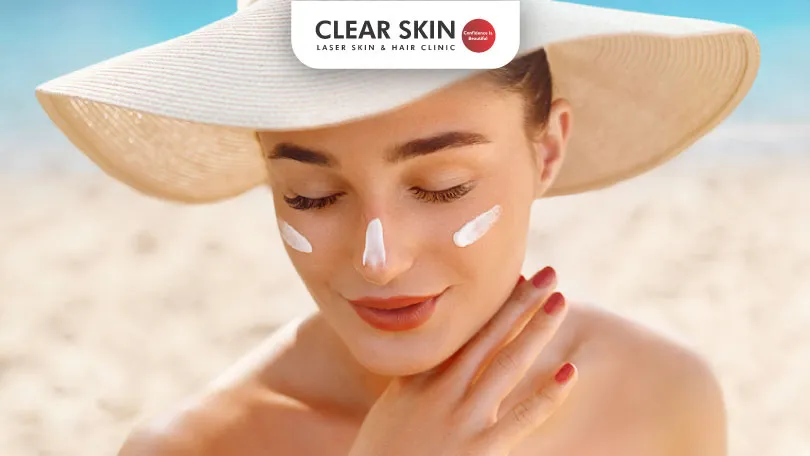Shield Your Skin: The Sunscreen Solution for Acne-Prone Skin
Reviewed By: Dr. Dhanraj Chavan
Updated on: 19 February, 2023

We all know that skincare is an essential part of our day-to-day routine. Basic skin care includes cleansing, moisturising and sun protection with the use of sunscreen. Now, if you are suffering from acne you might be wondering whether sunscreen for acne-prone skin is safe or not. Is it going to make your oily skin feel more sticky? Is it going to worsen your pimples?
Let’s look into the details and find out the answers to these questions.
Table Of Content
- What is Sunscreen?
- Role of Sunscreen in Acne
- Why do we Need Sunscreen if We Have Acne?
- Sunscreen Precipitating Acne
- Which Sunscreen to Choose if you are Prone to Acne?
- Side Effects of Sunscreen
- How to Use Sunscreen?
- Conclusion
What is Sunscreen?
Sunscreens safeguard our skin from the unsafe impacts of the sun rays by blocking their entry into the skin. This is achieved in two ways: active ingredients of sunscreen either reflect the UV rays like any mirror or screen (physical sunscreens) or absorb the UV rays themselves, preventing them from entering the skin (chemical sunscreens).
Thus, sunscreens prevent skin problems like tanning, sunburn, ageing, fine lines and wrinkles and even skin cancer.
Role of Sunscreen in Acne
Sunscreen and acne are related to each other in some way or the other. On the one hand, sunscreen is important when your dermatologist has started you on acne medications which makes your skin sensitive to the sun, on the other hand, there are some ingredients in sunscreens that might themselves precipitate acne.
Why do we Need Sunscreen if We Have Acne?
There are some positive roles that sunscreen plays in acne treatment because of which it should be used. These positive roles are:
Sunscreens help in preventing the worsening of post-acne pigmentation.
Sunscreens prevent the skin from developing redness which may arise out of the use of a few anti- acne oral and topical medications like retinoids.
Sunscreen Precipitating Acne
Sunscreen with heavy, oily and greasy bases tend to cause occlusion of skin pores thereby leading to acne/ pimple breakouts.
Premier Sunscreen for Acne-Prone Skin | Acne Prone Skin के लिए अच्छा Sunscreen
Which Sunscreen to Choose if you are Prone to Acne?
There are a few points to consider whenever you buy sunscreen for acne-prone skin. Following are some of these:
- Go for a non-comedogenic sunscreen
To begin with, to diminish the probability of getting acne, search for a non-comedogenic sunscreen.
- Choose a water/ light liquid base or gel form of sunscreen
It is suggested that people with oily skin should use a light base or gel sunscreen. The sticky or greasy feeling on the skin after sunscreen application can be prevented by using these.
- Sunscreen with moisturizer is good
A combination of moisturizer and sunscreen is good. The moisturizer keeps your skin hydrated the whole day and sunscreen with SPF 30 or more is an ideal option.
- Go for a non-perfumed, hypoallergenic and paraben-free sunscreen.
Side Effects of Sunscreen
There are certain side effects like allergic reactions which might occur due to the use of sunscreen. These present as redness, burning, tingling, and itching. It’s better to consult a dermatologist before using sunscreen for acne treatment.
How to Use Sunscreen?
It is generally advised to use sunscreen for acne-prone skin on a daily basis, 20-30 minutes before you step out in the sun and must be reapplied after every 2 hours for best results. Frequent reapplications are especially required after sweating heavily or after swimming.
Do You Know?
Roughly 250 Patients Are Treated
Everyday By These Dermatologists
(You are one click away from flawless skin)
Meet Our Dermatologist!
Conclusion
Remember that including sunscreen in your daily skincare routine can help your skin in a long way. Not just with the immediate effects or preventing tan, but also in the coming years by slowing down the aging process and preventing fine lines and wrinkles, skin cancers.
Proper utilisation of creams, moisturisers and sunscreens every day for acne-prone skin can diminish both fiery and non-provocative skin breakouts. You should pick a sunscreen that suits your skin impeccably and offers satisfactory sun security along with not causing any worsening of your pimples. Pick a blend of physical and chemical sunscreens for the most extreme advantages and a broad spectrum variety for ideal protection.
When in a dilemma about the best-suited sunscreen for acne-prone skin, do visit a dermatologist at Clear Skin Clinics Pune.
Further Reading
Does Makeup Cause Acne-Prone Skin?
Worried about breakouts from using makeup? Does makeup cause acne for you? Learn the safe ways to apply makeup for acne-prone skin.
Morning Skin Care Routine for Glowing Skin
Clear Skin Clinic, led by top dermatologists, shares the ideal morning skincare routine to help you achieve a radiant complexion naturally and effectively.
Monsoon Skin Care Tips for Radiant, Healthy Skin
Clear Skin Clinic, led by top dermatologists, shares the ideal morning skincare routine to help you achieve a radiant complexion naturally and effectively.
How To Take Care Of Oily Skin in Monsoon?
Oily skin care in monsoon focuses on gentle cleansing, hydration, and protection to reduce breakouts, greasiness, and help maintain skin balance daily.
Have thoughts? Please let us know
We are committed not only to treating you, but also educating you.





